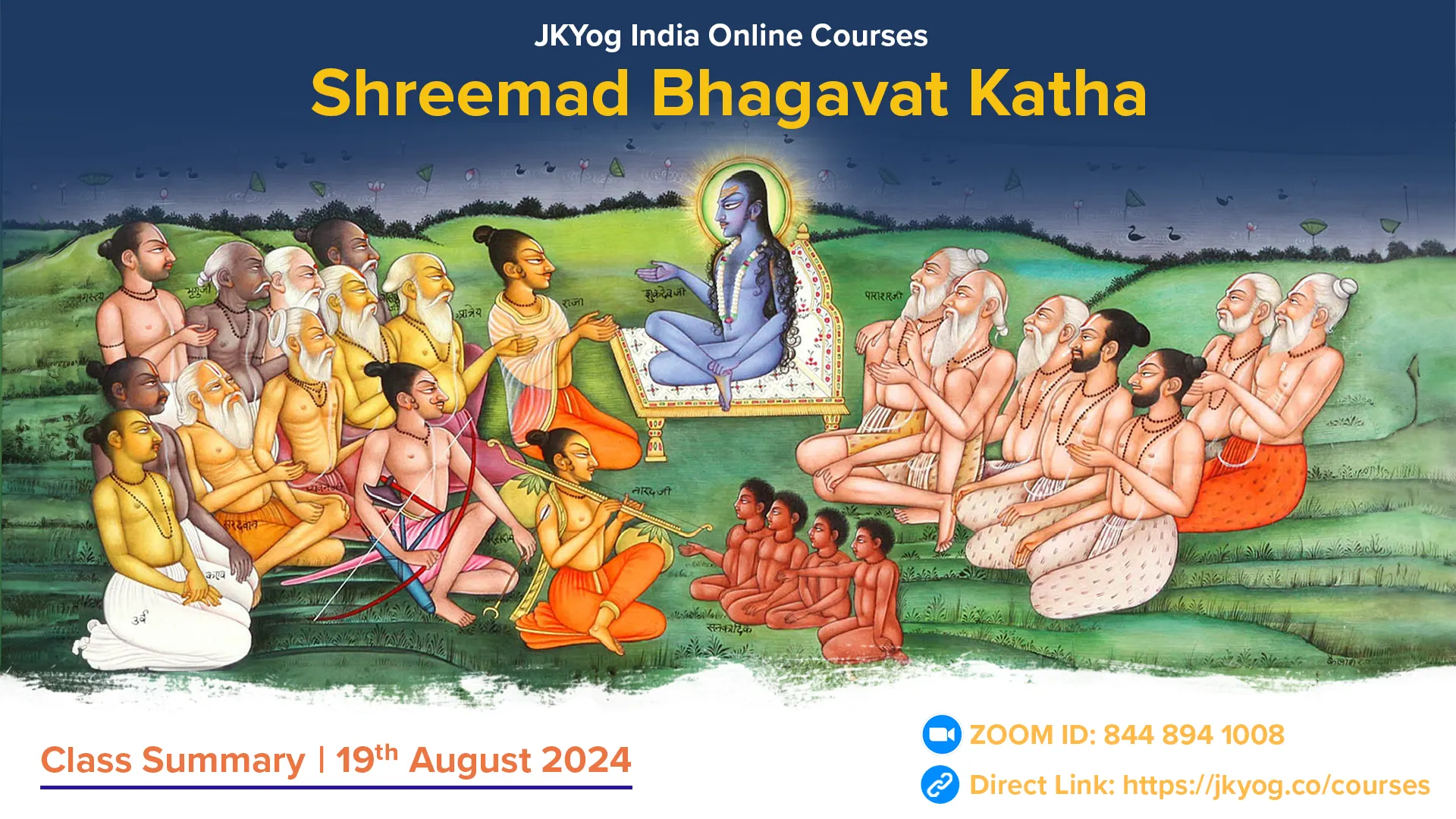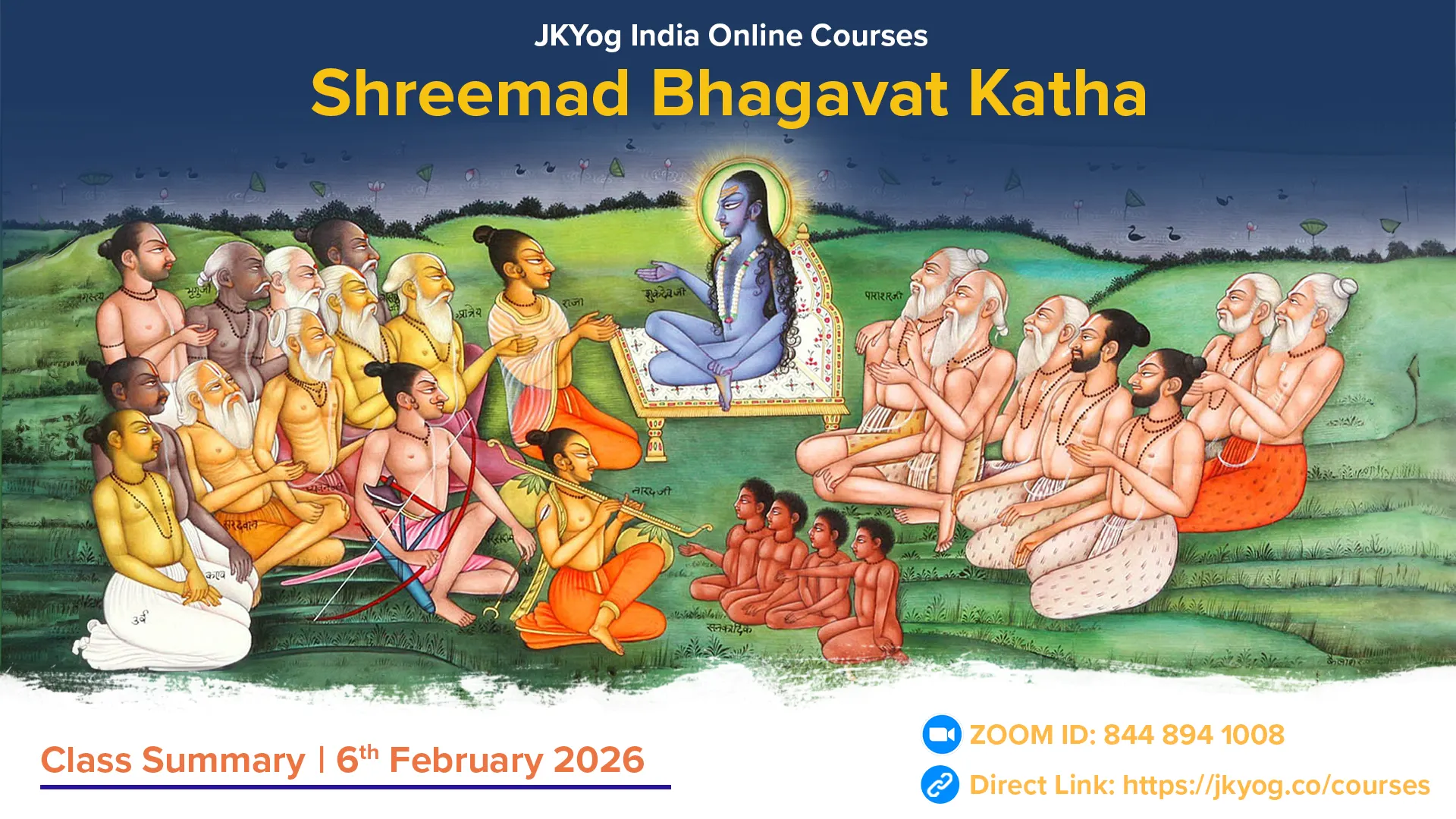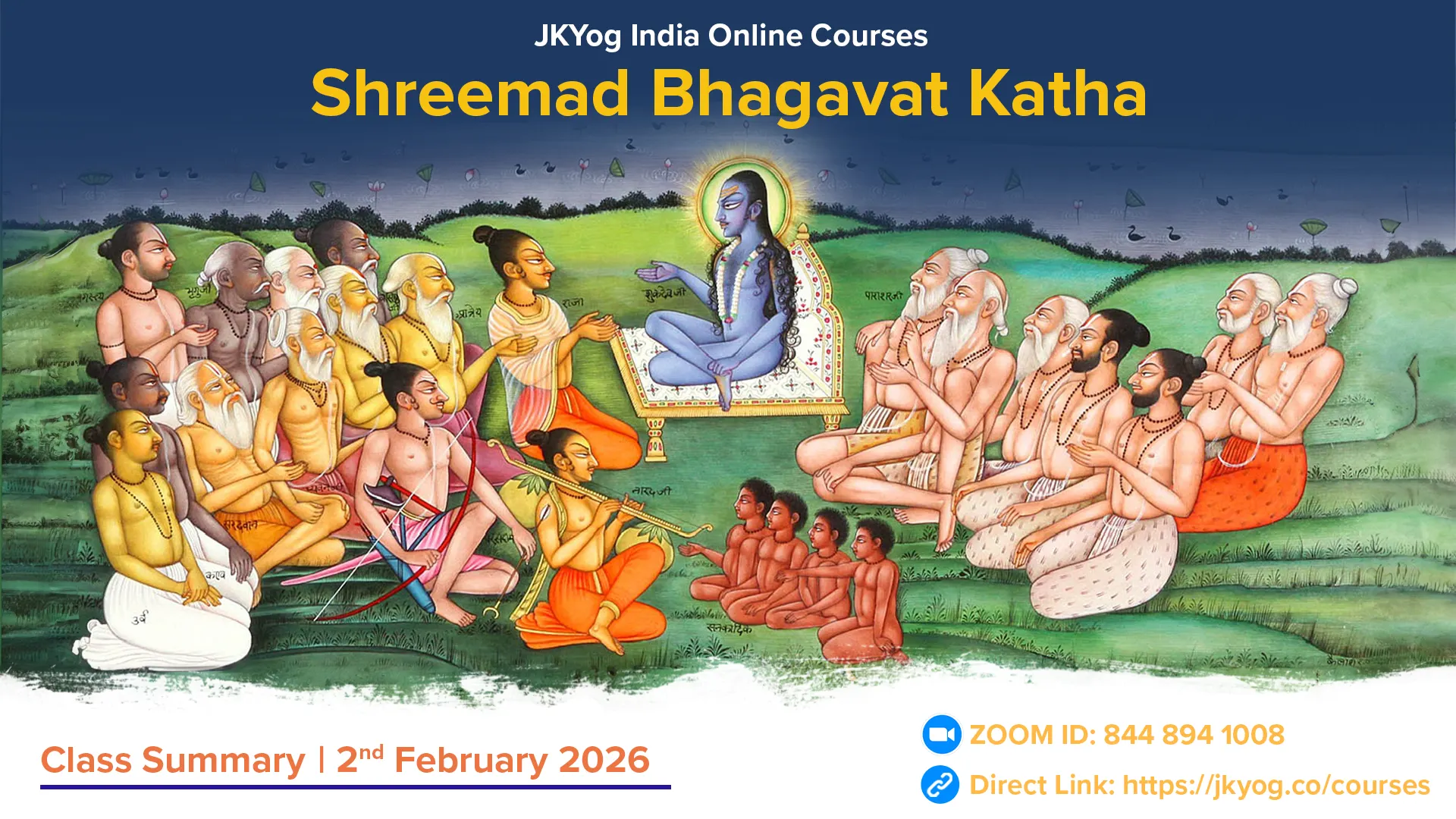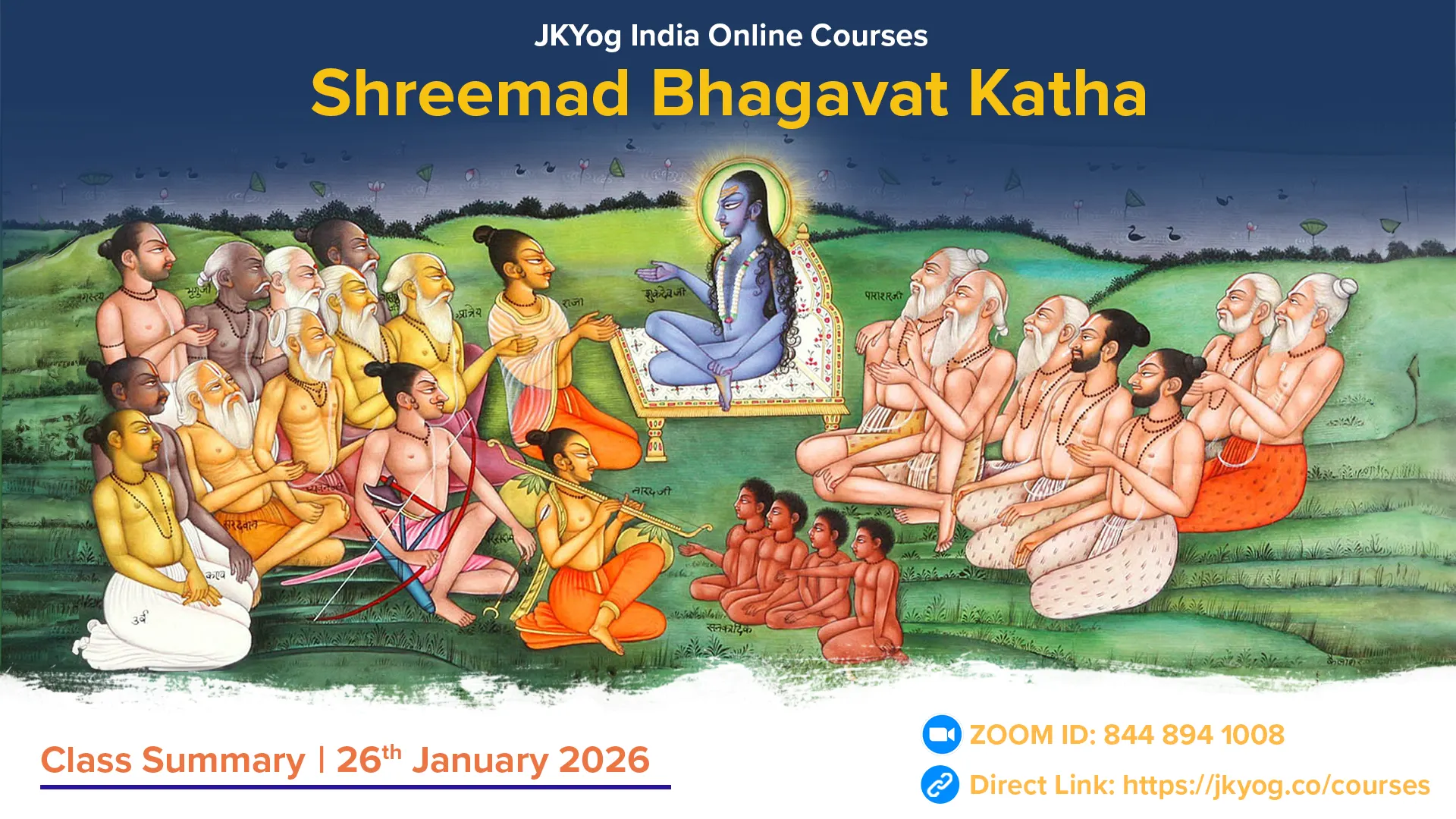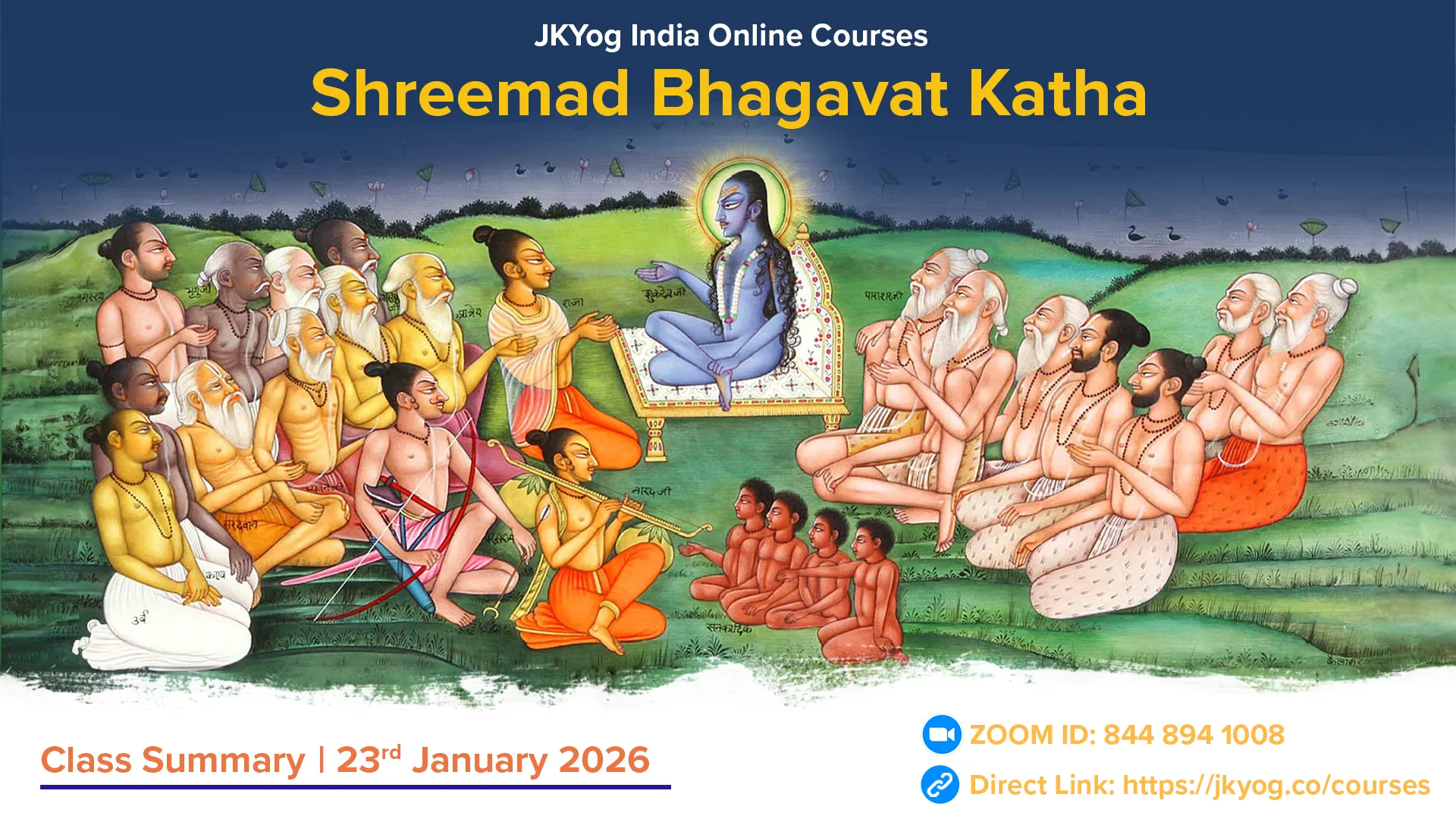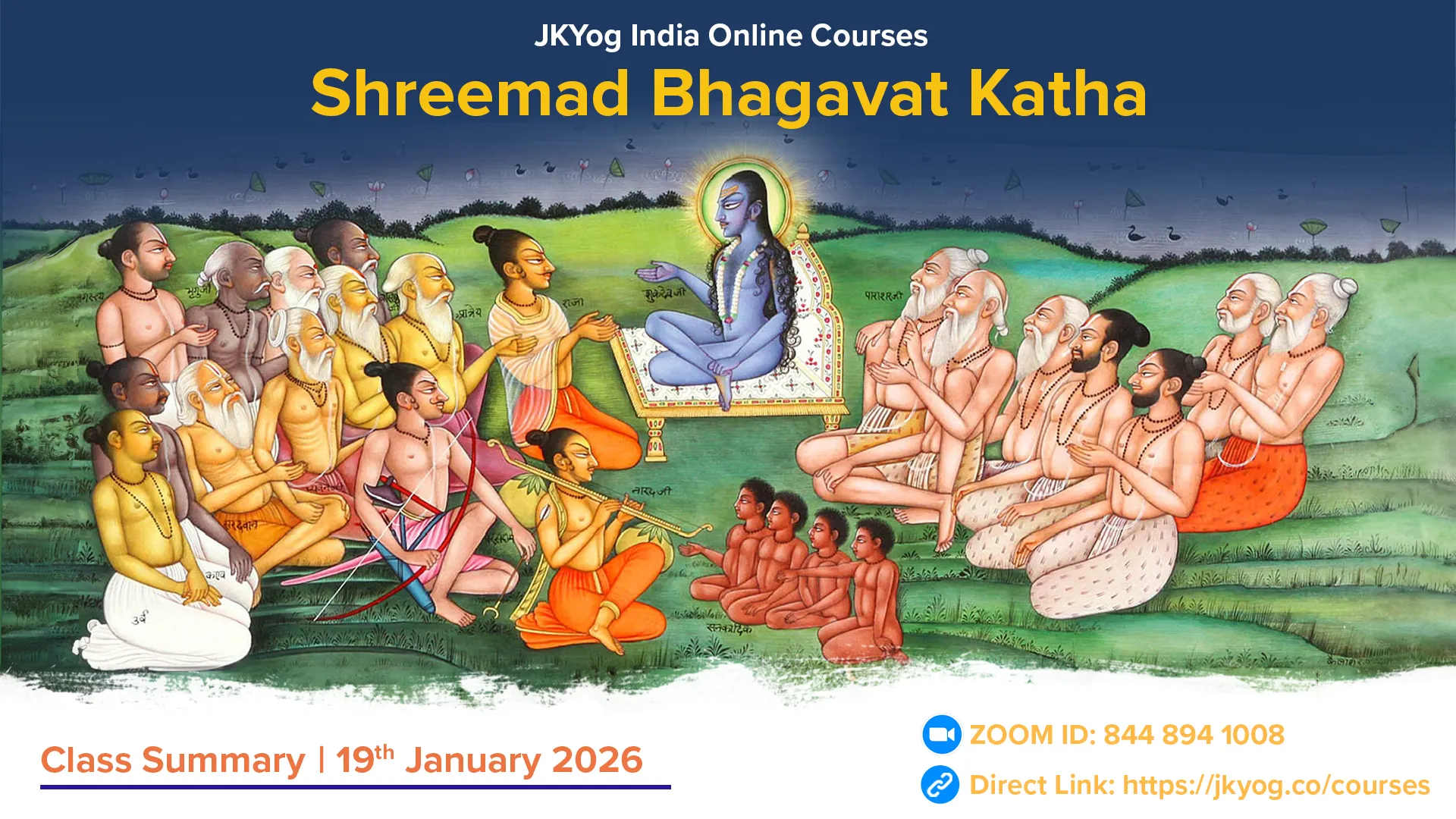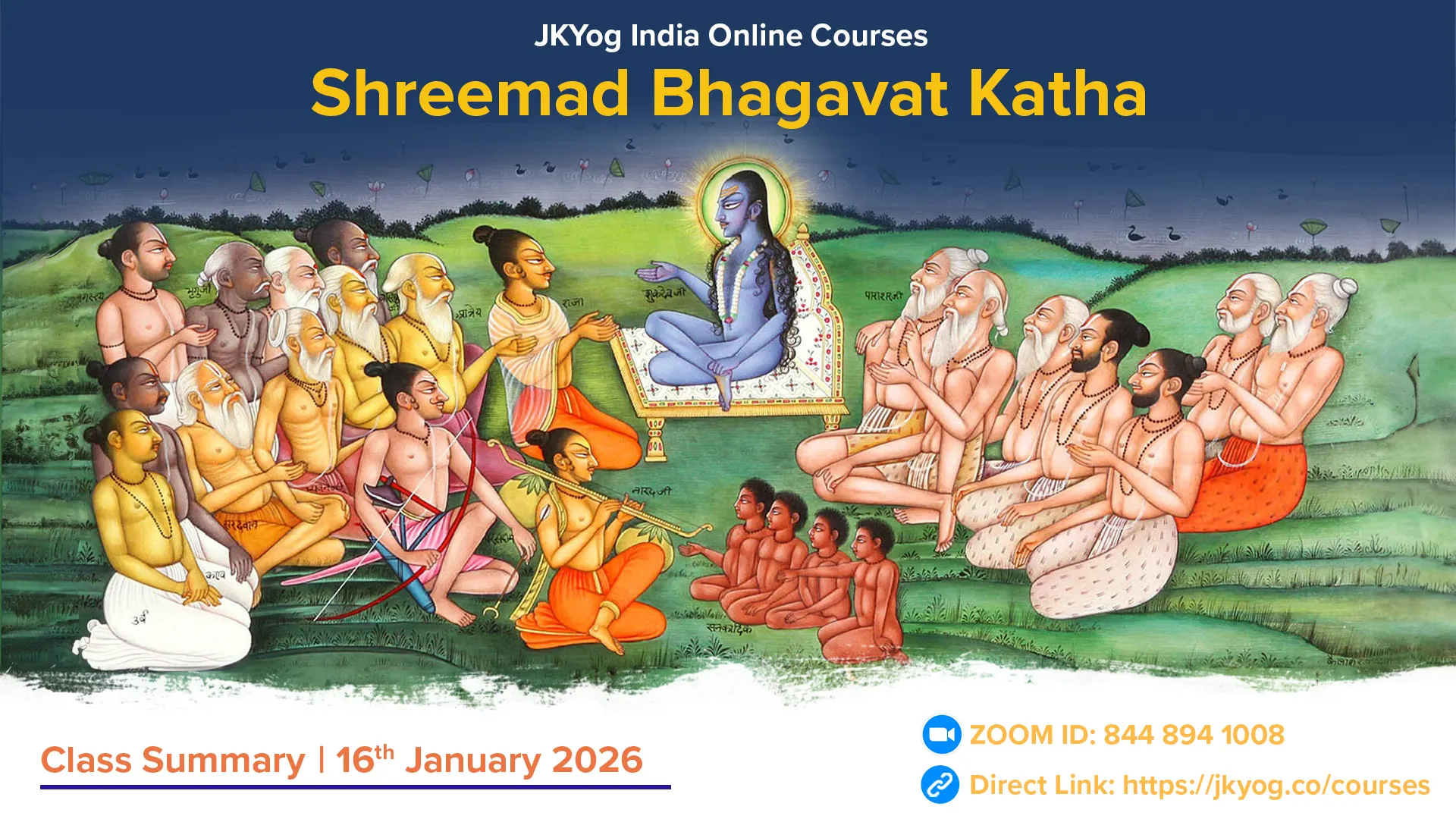Shreemad Bhagavat Mahapuran- Canto: 2, Chapters: 7, 8 & 9
After narrating the divine incarnations of Bhagwan, Brahmaji says to Naradji that when the universe is being created, the Supreme God manifests as:
- Tapasya,
- The nine Prajapatis,
- Sages like Marichi, and
- Brahma Himself, who contributes to the creation of the universe.
During the preservation of the universe, Bhagwan manifests as:
- Dharma,
- Vishnu,
- Manu,
- The gods, and
- The kings who maintain and protect the order of the universe.
And during the dissolution of the universe, Bhagwan manifests as:
- Adharma,
- Rudra (the fierce form of Shiva),
- Serpents like Krodhavasha, and
- Demons (Rakshasas), leading to the destruction of the universe.
Brahmaji further states that even a highly intelligent person who has counted every particle of dust on the Earth by his brilliance cannot enumerate the powers of Bhagwan. When God took the Trivikrama avatar (Vaman) and measured the three worlds, the entire universe began to tremble with the unstoppable force of His feet. At that time, it was also He who stabilised it with His power. Jagadguru Shree Kripaluji writes:
Bhumi ke paramanu Govind Radhey, gin bhi lo Hari guna amit bata de.
Aganita guna gana Govind Radhey, suni Shuka Brahma samadhi bhula de.
Counting the atoms of the Earth might be possible, but it is impossible to measure or count the boundless qualities of Shree Krishna.
God’s countless divine attributes are so infinite that even Shukadev and Brahma, in their state of deep meditation, are overwhelmed and forget their meditative state upon hearing about His glories.
Those who, without any deceit or guile, surrender everything— including their very existence—at the feet of Bhagwan receive His divine grace. It is through His mercy that they are able to comprehend His Maya and transcend it. Tulasidasji said-
Binu Vishwas bhakti nahi, this binu drain na Ram.
Ram-kripa binu sapanehun, jeev na lahi vishram.
Without faith, true devotion is unattainable, and without the grace of Ram, the soul cannot find peace or rest, even in dreams.
The great souls who surrender to Bhagwan renounce feelings such as "this is mine" and "this is me," whether regarding their own body or their children and other relations. They do not consider the body or their relations as their possessions. Brahmaji says to Naradji, "Narad! I have the knowledge about the Yogamaya power of Bhagwan, and so do you, Bhagwan Shankar, Prahlad, Shatarupa, Manu, Priyavrat, and others like Pracheenabarhi, Ribu, and Dhruv. Besides them, Ikshvaku, Pururava, Muchukunda, Janak, Gadhi, Raghu, Ambarish, Sagar, Gaya, Yayati, Mandhata, Alarka, Shatadhanva, Anu, Rantidev, Bhishma, Bali, Amurtaraya, Dilip, Saubhari, Uttanka, Shibi, Devala, Pippalada, Sarasvata, Uddhava, Parashara, Bhurishena, Vibhishana, Hanuman, Shukadev, Arjun, Arishtisena, Vidura, and Shrutadeva—these great souls also understand it. Those who have associated with Bhagwan's loving devotees, even if born in underprivileged and unfortunate circumstances, and even if they take birth in lower forms like animals or birds, are able to understand the mystery of Bhagwan's Maya and cross over the ocean of worldly existence."
The True Nature of the Supreme Soul- Paramatma
The true nature of the Supreme Soul (Parmatma) is uniform, peaceful, fearless, and purely made of knowledge. He is free from the impurities of Maya, and the inequalities of the world do not exist within Him. The Supreme Soul is beyond both the manifest (sat) and the unmanifest (asat). No Vedic or worldly words can reach Him, nor can the fruits of actions touch Him. What to speak of others? Even Maya cannot stand before the Supreme Soul; she flees in shame. The great souls experience Him as the sorrowless, infinite, blissful form of Brahman. Bhagwan is the giver of the results of all actions. Even after the elements of this body separate and the body perishes, the Unborn person residing within does not perish.
Brahmaji further says, "I have briefly described to you the all-powerful Shree Hari, who created the universe through His will. Whatever is cause and effect, existence and non-existence, is not separate from Bhagwan. Yet, Bhagwan is also distinct from all this. The teaching Bhagwan imparted to me is this 'Bhagavatam.' It contains a brief description of Bhagwan's divine glories. You should expand upon it. Describe it in a way that invokes loving devotion for Bhagwan Shree Krishna in everyone. Those who describe, listen to, or approve of the narration of Bhagwan's inconceivable power of Maya will never have their minds deluded by it."
Questions of King Parikshit to Shukadevji
In the eighth chapter of the second canto of the Shreemad Bhagavat, King Parikshit poses the following questions to Shukadevji:
- When Brahmaji instructed Naradji to describe the qualities of the Nirgun Bhagwan, to whom and in what form did Naradji give these teachings?
- Please narrate to me the stories related to Bhagwan's inconceivable powers that bring the highest welfare to people.
- How can I, with a mind detached from worldly attachments, immerse my consciousness in Bhagwan Shree Krishna, who is the soul of all, and leave my body?
- How does the regular hearing and narration of Shree Krishna's divine pastimes lead to the manifestation of Bhagwan in the hearts of devotees?
- How does Shree Krishna enter the hearts of devotees through the ears, and how does He cleanse their minds of impurities?
- Once their hearts are purified, how is it that such devotees never forsake Shree Krishna's lotus feet, even for a moment?
- Although the living being has no inherent connection with the five elements (panchabhutas), how is the body composed of these elements?
- What is the significance of the process by which the lotus that emerged from Bhagwan's navel, where the worlds were created, took place?
- Bhagwan, by whose grace Brahmaji creates living beings, after renouncing Maya, in what form and where does He rest?
- You have said that the worlds and their rulers were created from the limbs of the Virat Purush. What does this mean?
- What are the numbers of Mahakalpa and Avantara Kalpa? How is time measured?
- How is the subtle and gross movement of time understood?
- How many and what kinds of movements occur due to various actions of living beings?
- How do living beings attain different forms of birth, such as gods, humans, etc., and what actions do they perform to obtain specific births?
- How do the Earth, netherworld, sky, planets, stars, mountains, rivers, oceans, islands, and the living beings within them come into existence?
- Please describe the dimensions of the universe, both internally and externally.
- Please explain the differences between the yugas (ages), their durations, and their respective dharmas.
- What are the general and special dharmas (duties) of humans?
- What are the number, nature, and characteristics of the elements?
- What is the method of worshipping Bhagwan and the practice of Bhakti Yog?
- What divine powers do the great yogis attain, and what ultimate state do they achieve?
- How is the subtle body of the yogis dissolved?
- What are the nature and significance of the Vedas, Upavedas, Dharmashastras, Itihasas, and Puranas?
- How do the creation, maintenance, and dissolution of living beings occur?
- What is the nature of the soul's bondage and liberation, and how does it remain situated in its true form?
- How does Bhagwan play with His Maya, and how does He become indifferent to it, like a witness, after renouncing it?
Sutaji tells Shaunakji that when King Parikshit requested Shukdevji in the assembly of saints to narrate the divine pastimes of Bhagwan, Shukadevji was greatly pleased. He then narrated to Parikshit the revered Shreemad Bhagavat Mahapuran, which Bhagwan Himself had narrated to Brahmaji at the beginning of the Brahma Kalpa. Shukadevji starts answering all the questions that Parikshit had asked by explaining that just as a person in a dream has no real connection with the objects he perceives, similarly, the soul has no true connection with material objects without Maya. Due to Maya, the soul appears in various forms and develops the sense of "I am," but when the soul returns to its natural state, it transcends the qualities and becomes completely detached.
Brahmaji Performed Penance for a Thousand Divine Years
Brahmaji, seated on his birthplace, the lotus, began to contemplate creation. However, he did not have access to the knowledge or vision required to create the universe. One day, while he was absorbed in this concern, he heard the 16th and 21st letters of the alphabet, 'ta' and 'pa,' from the ocean of dissolution, which together formed the phrase 'tapa-tapa' (meaning 'perform penance') repeated twice. Upon hearing this, Brahmaji looked around to see if anyone else was present, but he saw no one. Resolving that God had directly instructed them to perform penance, he sat back on his lotus and immersed himself in meditation. He engaged in penance for a thousand divine years, focusing his mind, vital energy, and senses in concentration. Pleased with his devotion, Bhagwan revealed to him His supreme abode, which is the highest and beyond the reach of any other abode.
What is the Divine Vaikunth Lok of Bhagwan Like?
Wah Hari Dham to Govind Radhey. Dhamon mein hai sarva-sreshth batade.
Us divya dham mein Govind Radhey. Kaal karma maya jaaye na batade.
Wahan nahin maya ke Govind Radhey. Sattva raja tama teenon gun bhi batade.
Wahan to nivas karen Govind Radhey. Hari ke nitya parshad hi batade.
Hari ka sharir wahan Govind Radhey. Divya tej yukt shyam rang ka batade.
Kamal netra pitapat Govind Radhey. Rom rom ras saundarya batade.
Ang ang manimay Govind Radhey. Bhushan te bhushit hai batade.
Moonge vaidurya mani Govind Radhey. Kamal tantu si chhavi hai batade.
Sir pai hai mukut Govind Radhey. Kaan mein kundal kanak batade.
Us Hari Dham mein Govind Radhey. Kamala karen pad seva batade.
Brahma ne dekha wahan Govind Radhey. Parshad karen paricharya batade.
The divine abode of Hari is the supreme of all realms. Time, karma, and maya do not exist in this transcendent realm. Maya is absent, and the three gunas—sattva, rajas, and tamas—are nowhere to be found. Here, the eternal associates (Parshad) of Hari reside.
Hari's form is of divine radiance and a dark hue in this sacred abode. His eyes are like lotus petals, and He wears yellow garments that enhance His beauty and sweetness, manifesting in every pore of His being. Each part of His divine body is adorned with precious gems and ornaments, including coral and sapphire, adding to His lotus-like appearance. On His head rests a splendid crown, and golden earrings adorn His ears. In this exalted realm, Lakshmi serves at His divine feet, while Brahma witnesses this divine grandeur, and the associates carry out their devoted service.
Brahmaji saw the Supreme God seated on a most excellent and priceless seat in that divine Vaikuntha realm, surrounded by twenty-five manifestations of power: Purush (the cosmic person), Prakriti (nature), Mahat-tattva (the great principle), Ahankara (ego), Mana (mind), the five senses, and the five tanmatras (subtle elements). The Bhagwan is eternally endowed with six divine, perfected qualities: Aishwarya (opulence), Dharma (righteousness), Kirti (glory), Shree (prosperity), Jnana (knowledge), and Vairagya (detachment). These qualities do not reside anywhere else in their eternal form. The Supreme Bhagwan remains immersed in His infinite, eternal, blissful form.
Upon seeing God's divine abode, Brahma's heart was filled with joy, his body shivered, and tears of love welled up in his eyes. He bowed his head in reverence at the Bhagwan's lotus feet, which are attainable only by the self-realised sages. The Supreme God, delighted by Brahma's devotion and readiness to create, shook hands with him with a smile and said, "Brahma, you already possess the knowledge of all the Vedas in your heart. You have pleased me by performing austerities for a long time to create the universe. Those who practice yog with deceit in their hearts can never please me. Whatever desire you have, you may ask for it. You have seen my abode because of your severe penance, even without seeing me directly. You were in doubt about the creation process at that time, so I instructed you to perform penance. Penance is my heart, and I am the soul of penance. Through penance, I create, maintain, and ultimately dissolve the universe. Penance is my unique and powerful energy."
When the Bhagwan asked Brahma to request a boon, Brahma asked for:
- Brahma requested Bhagwan to grant him knowledge of both His Nirguna (formless) and Saguna (with attributes) aspects.
- Brahma wanted to understand how Bhagwan, with His power maya, creates, maintains, and destroys the world.
- He prayed that he may not be bound by the ego of doership ("I am doing it") while performing the act of creation.
- Brahma requested that he remain vigilant while following Bhagwan's instructions.
- He prayed that he may not become entangled in arrogance while engaged in the creation process.
Bhagwan replied, "I will reveal to you the most confidential knowledge of My form, which is full of loving devotion. As for My extent, attributes, forms, qualities, and pastimes—through My grace, you will experience their essence precisely as they are."
Chatushloki Bhagavat: The Essence of Bhagavatam in Four Verses
Saying this, Bhagwan imparted the knowledge of the Chatu-Shloki Bhagavat to Brahmaji.
Aham eva asam agre na anyad yat sadasat param
Pashchat aham yad etat cha yo avashishyet so asmy aham.
Ṛte artham yat prateeyet na prateeyet cha atmani
Tad vidyat atmano mayam yatha abhaso yatha tamah.
Yatha mahanti bhutani bhuteshu uchchavacheshu anu
Pravishtani apravishtani tatha teshu na teshu aham.
Etavad eva jijnasyam tattva jijnasuna atmanah
Anvaya vyatirekabhyam yat syat sarvatra sarvada.
Bhagwan says that before the creation of the universe, only He existed. Apart from Him, there was no gross or subtle object, nor was there any ignorance. Even where this creation does not exist, only Bhagwan remains. Everything that appears in this creation is also Bhagwan. And when the creation ends, whatever remains will still be Bhagwan. (Bhagavat 2.9.32)
Bhagwan says that objects which do not truly exist but appear to do so are His maya. Just as the reflection of the sun in the sky appears in water, etc., this reflection is outside the sun itself, and it appears only due to the sun's support. Similarly, maya remains outside the powerful Bhagwan but functions with His support. Darkness always stays away from light, but the perception of darkness would be impossible without light. It is only through the light of the eye that one can determine darkness. (Bhagavat 2.9.33)
The bodies of living beings contain the five great elements (ākāśa, vāyu, agni, apā, pṛthvī), which are involved in the formation of the body, but these elements are already present everywhere. Similarly, Bhagwan is within the bodies of living beings as the soul, but from the soul's perspective, Bhagwan alone is everything, and no other object is necessary. (Bhagavat 2.9.34)
The scriptures state, 'This is not Brahman, this is not Brahman' (negation) and 'This is Brahman, this is Brahman' (affirmation), which means that Bhagwan is present everywhere and always. He is the ultimate reality, and to understand the essence of the soul, it is only necessary to comprehend this truth. (Bhagavat 2.9.35)
After this, God instructs Brahma to remain in unwavering meditation and maintain complete devotion to the principles He has provided. By doing so, Brahma will never fall into illusion, even while creating the universe in various forms during each cycle of creation. Shukadevji says that after giving this instruction to Brahma, God disappeared. Afterwards, Brahma bowed with folded hands and then created the world in the same form as he had in the previous cycle of creation.
Shukadevji tells King Parikshit that once, Brahma meticulously followed the yam and niyam to fulfil his duty of creation. At that time, among his sons, the most beloved and devoted, Sage Narad, with great restraint, humility, and gentleness, served Brahma with the desire to understand the essence of Bhagwan's maya and thus greatly pleased Brahma. When Sage Narad saw that his father Brahma was pleased with him, he asked the same questions that King Parikshit had asked Shukadevji. Brahma became even more pleased with Naradji's questions. He then narrated the same Bhagavat Purana with ten characteristics to his son Narad, which Bhagwan Himself had imparted to him.
Shukadevji says that when my supremely radiant father (Ved Vyas) was meditating on Bhagwan on the banks of the Sarasvati River, Sage Narad narrated the same Bhagavat Purana to him. Shukadevji continues that the answers to King Parikshit's questions, such as how the universe originated from the Virat Purush and numerous other questions, are provided in the form of Bhagavat Purana. Saying this, Shukadevji then describes the ten characteristics of the Bhagavat.
Summary: JKYog India Online Class- Shreemad Bhagavat Katha [Hindi]- 19.08.2024

